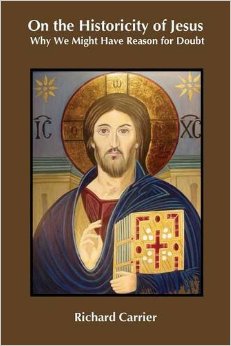The focus of my response will center on Carrier’s
- claim that a pre-Christian angel named Jesus existed,
- his understanding of Jesus as a non-human and celestial figure within the Pauline corpus,
- his argument that Paul understood Jesus to be crucified by demons and not by earthly forces,
- his claim that James, the brother of the Lord, was not a relative of Jesus but just a generic Christian within the Jerusalem community,
- his assertion that the Gospels represent Homeric myths,
- and his employment of the Rank-Raglan heroic arche-type as a means of comparison.
(Gullotta, p. 325. my formatting/numbering for quick reference)
For an annotated list of previous posts in this series see the archived page:
Daniel Gullotta’s Review of Richard Carrier’s On the Historicity of Jesus
For other Archives by Topic, Annotated see the right margin.
–o–
This is the most difficult of my posts so far discussing Daniel Gullotta’s treatment of Richard Carrier’s On the Historicity of Jesus. On pages 336 to 340 of his review Gullotta conveys the clear impression that Carrier has relied primarily, even perhaps entirely, on Dennis MacDonald’s thesis that the Gospel of Mark was based on Homer’s Odyssey and last two books of the Iliad and has consequently concluded that the gospel is primarily myth rather than remembered history. Gullotta further leads readers to understand that Carrier claimed Jesus was essentially based on Homer’s character Odysseus and that criticisms of MacDonald’s entire thesis equally applied to Carrier’s treatment of the Gospel of Mark. I will demonstrate that all of this representation of Carrier’s argument is grossly misleading. One scarcely knows where to begin.
Let’s start with his heading for this section Mark, the Christian Homer? Jesus, the Jewish Odysseus? That heading sets up the expectation that we will learn that Carrier argues accordingly.
Gullotta begins, however, with a genuine Carrier assertion unrelated to the Homeric thesis of MacDonald: that the characteristics of myth are a combination of
- (1) strong and meaningful emulation of prior myths (or even of real events);
- (2) the presence of historical improbabilities (which are not limited to ‘miracles’ but can include natural events that are very improbable, like amazing coincidences or unrealistic behavior); and
- (3) the absence of external corroboration of key (rather than peripheral) elements (because a myth can incorporate real people and places, but the central character or event will still be fictional).
(my formatting)
 Gullotta seems perturbed by the idea that such criteria should invalidate the Gospel of Mark as “remembered history” when he comments:
Gullotta seems perturbed by the idea that such criteria should invalidate the Gospel of Mark as “remembered history” when he comments:
Because of this, Carrier deems the Gospels to be ‘allegorical myth, not remembered history’.
(Gullotta, p. 337)
I thought most critical scholars, even devout Christian ones, considered the gospels to be primarily mythical or theological tales long removed from history. The question Carrier is taking up is whether there was a historical Jesus behind them at the beginning.
But even at this early point of the discussion Gullotta leads readers to think that such criteria and understanding of myth is Carrier’s idea. He begins the criteria with
According to Carrier, ‘the gospels are primarily and pervasively mythical’ and he bases this assessment on the following criteria
and Gullotta gives readers no indication that those criteria are Carrier’s distillation of lengthy scholarly discussion and debate.
When one turns to Carrier’s discussion of myth and its relationship with the gospels one finds that Carrier has in fact drawn upon the following scholarly corpus (taken from several pages between 380 and 396, my formatting) as the basis of his understanding of myth itself and ways in which the gospels themselves are mythical narratives: Continue reading “Gullotta’s Misleading Portrayal of Carrier’s Argument (Gospels Myth or Remembered History? – Part 1)”
